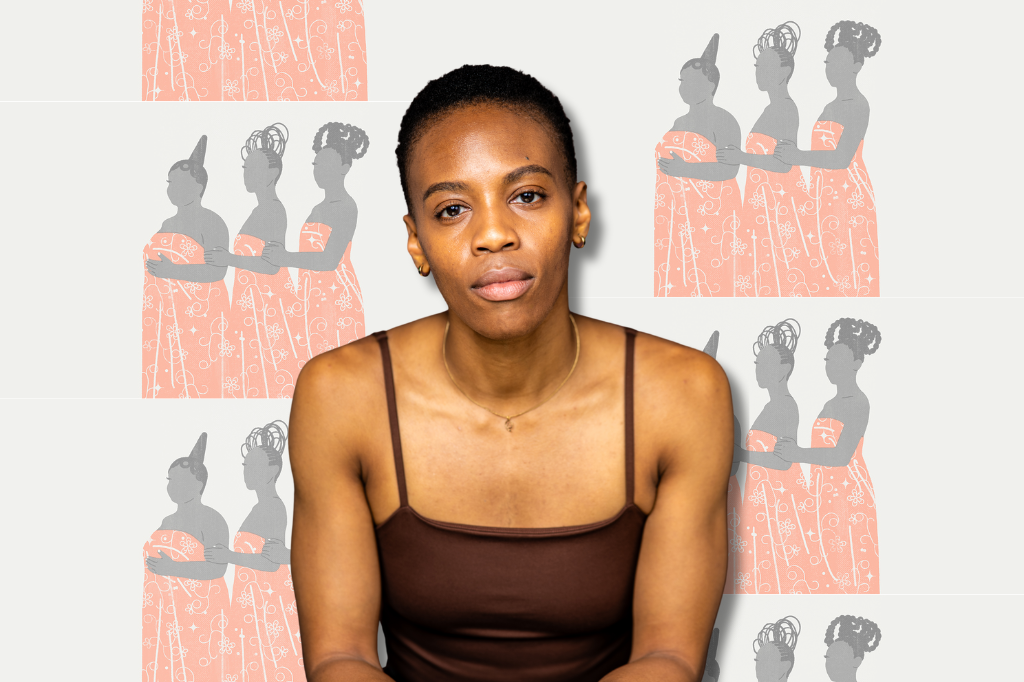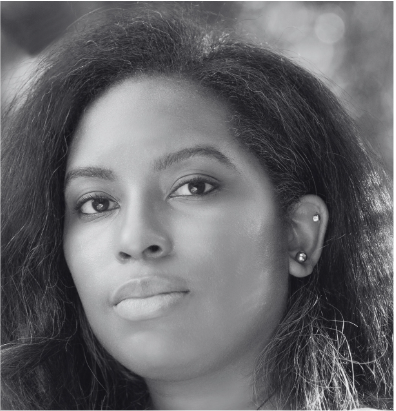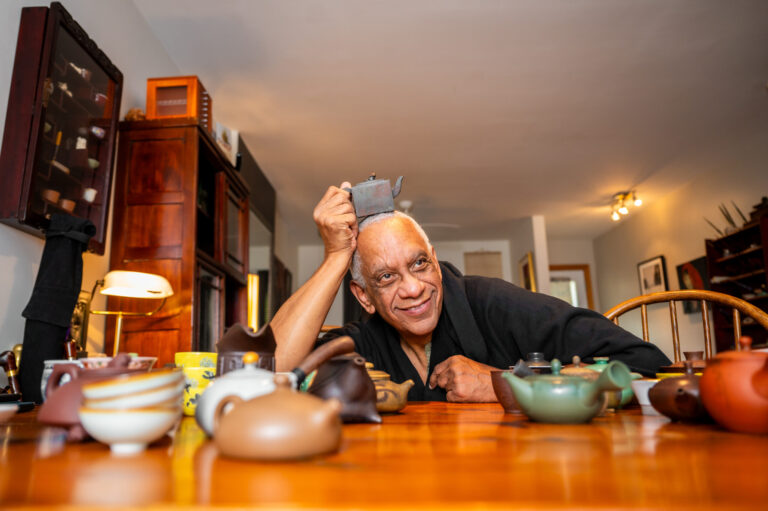Soulpepper digs into Nigerian history with Canadian premiere of Inua Ellams’ Three Sisters
According to actor Amaka Umeh, we could spend generations bringing stories and culture from Africa’s 54 countries to Canada, and still not exhaust a fraction of what the continent has to offer.
Umeh stars in Three Sisters, Inua Ellams’ adaptation of Chekov’s play of the same name. This month, the play will receive its Canadian premiere at Soulpepper Theatre in a co-production with Obsidian Theatre, directed by Mumbi Tindyebwa Otu.
In his adaptation, Ellams retains the relationships and arc of the original play, but moves the action from Russia to Nigeria. Instead of following the Prozorovas in the Russian countryside, Ellams invites us into the world of the Onuzos, an Igbo family living in the small village of Owerri. The play starts one year after the death of their patriarch, who moved them away from Lagos in an attempt to slow the ravages of colonialism on their Igbo culture.
The Onuzos are made up of the titular three sisters — Lolo, Nne Chukwu, and Udo — who, along with their brother Dimgba, lead middle-class lives, as highly educated young people wistful for the big city of Lagos.
But their lives take a sharp turn when months after Biafra secedes from Nigeria and declares its independence, the Biafran War erupts.
Umeh is of Igbo heritage, and while this is their third Nigerian play, it’s their first Igbo one. Having grown up in West Lagos, Umeh has now spent more time in Canada than in their home country, and is often at the centre of history-making Canadian theatre, such as being the first Black, non-binary actor to play Hamlet at the Stratford Festival. Having had a very English upbringing, Umeh did not grow up knowing to be curious about African history, noting in an interview that “the unfortunate thing is how readily in my youth, I was taught that Nigeria is not the place to be. It’s not the place where your dreams come true. Everyone’s aspiration is to leave. Get your papers, get your scholarship, get your sponsorship.
“By any means necessary, leave that place,” they continued. “It has a history of being abandoned.”
And while Umeh has a desire to reinvest their education and experience in Nigeria, they say the opportunity to play more African characters has come just in time.
“I started to uncover this blossoming career and this interest that people had in giving me opportunities that would really help me grow and shift the status quo,” they said. “I started to wonder what it is that I’m interested in saying. How do I see the world? What is my voice for? And the first thing that came to mind was African stories — I’m an African person. As soon as I said that, and started to wish and dream and hope to go back to Nigeria and participate in the artistic culture there, all of a sudden, Canadians are like, ‘Hey, we know that African plays exist. Let’s bring some here for you to do.'”
While Umeh does research for every play, they have an “ancestral personal connection” to this piece, which makes the process a “taxing undertaking.” They say they feel some survivor’s guilt, as their parents were children during the war.
“I talked to my parents, and the conversation wasn’t easy because they were children when this happened, and they survived probably by providence,” they explained. “I’m still in the process of excavating stories from my family, but I don’t know if that’s helpful. It’s triggering and traumatic for them. But it is a good way to meet them. I’m meeting whole new people in them, which I feel very lucky for, and feel is important to do because time is finite.”
For those unfamiliar with the history, the Biafran conflict arose in the midst of the movement for African independence from European colonialism which began in the 1920s with Egypt and moved through the continent into the 1950s and ‘60s. When Nigeria gained independence in 1960, the legacy of British colonialism formed “Nigeria,” which contained over 250 ethnic groups. The Republic of Biafra, composed of mainly Igbos, seceded in 1967, which led to a brutal civil war. Lasting two and a half years, the Biafran War was a bloody, tragic conflict that cost the lives of one to three million Biafran citizens, most of whom were civilians. It’s reported that only 10 per cent of the casualties were from military action. The rest were a result of systematic starvation and blockades by the Nigerian federal government of food and supplies.
By 1969, it was reported that over 1,000 children a day were starving to death, mainly suffering from kwashiorkor, a fatal protein deficiency. Sometimes considered one of the first genocides in post-colonial Africa, the Biafran War is not just a mere historical fact. Umeh believes the legacy of the war is “a problem we’ve all inherited, whether or not we know it or feel that way.
“We have a responsibility to understand [the conflict] and [re-]orient our lives [accordingly],” they said.
In Three Sisters, Umeh plays Igwe, a staff captain in love with one of the sisters. He’s a complex and at times repulsive character, with frequent outbursts imbued with misogyny, though Umeh says they can relate to “his haunted-ness and need to be understood and loved.”
To prepare for the role, Umeh journaled, listened to music, and participated in lots of collaborative dance parties, since music is medicine and a key part of African storytelling. They’re thankful they don’t have to do the work alone.
“Everyone in this play is so caring and has, it feels like such a stake [in the story]. They are holding on to it and bringing the core of who they are also and their stories and their knowledge.” In addition to the cast and crew, they also drew strength from the director, Otu.
“I really enjoy working with Mumbi, she’s so very gentle,” said Umeh. “Just a kind, pure spirit. And she also has just a wicked, unexpected sense of humour and this beautiful pealing bell of a laugh, which I love to hear.” Especially given the difficulty of the work. Umeh has also been reading their “uncle Shakespeare, because Shakespeare is my uncle” and Christopher Okigbo, a Nigerian poet Igwe greatly admires, who died fighting for Biafran independence soon after the war started.
When asked about the weight of presenting this nuanced, stunning story, Umeh spoke about the dichotomy of Afrobeats becoming mainstream in Western culture while in Africa people are “not able to afford rice and having to count grains.” As much as Umeh does not want to present Africa as a single story of poverty or lack, as warned against by Chimamanda Ngozi Adichie, “both realities exist at the same time.” Which is why Umeh holds that “it’s so important that Nigerians transcend the single story,” by pursuing and representing a variety of fields and professions, including the arts, which thankfully, has been happening.
In bringing more African stories to Canada, such as Ellams’ Three Sisters, Umeh is excited for a Canadian audience to centre a piece of African experience.
“We teach a lot of this history and it’s unfolding in real time as the play happens, but we don’t get to all of it — and then it ends in 1970. So from then till now, what is the turnout of that crisis? What’s the fallout?” they said. “It’s a great starting point. But I’m hopeful that people will pick up from where this leaves off.”
Three Sisters begins performances on February 29 and runs until March 24 at Soulpepper Theatre. Tickets are available here.











Comments